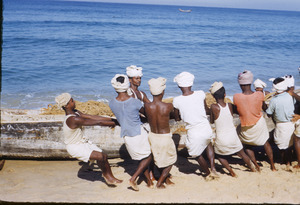University of Massachusetts Amherst Libraries Special Collections and University Archives
Joel Martin Halpern Papers, 1932-2009 (bulk: 1948-2008)
The anthropologist Joel Martin Halpern (1929- ) has worked in regions from the North American arctic (meaning Canada and Alaska) to tropical Laos in Southeast Asia, but he has concentrated on Southeast Europe, principally, Yugoslavia. He is perhaps best known for his studies of social modernization in the Balkans. Following undergraduate study in history and anthropology at the University of Michigan (BA, 1950), Halpern studied at the renowned anthropology department and Russian Institute, (renamed the Harriman Institute in 1982) at Columbia University. He received his doctorate in 1956 for a study of the village of Orasac in Serbia in the former Yugoslavia. The resulting work became the basis of his Ainsley award winning book, A Serbian Village (N.Y., 1958). He began his career with the Human Relations Area Files office at the American University in Washington, D.C. working on a Laos handbook. Subsequently, he went to that country as a Field Service Officer with the Community Development Division of the U.S. International Cooperation Administration. He served as chair of the Mekong Seminar of the Southeast Asia Development Advisory Group of the Asia Society which advised the U.S. Aid program. Halpern was a member of the faculty at UCLA, Brandeis, and the Russian Research Center at Harvard (1965-1967) before coming to UMass Amherst in 1967. Throughout Halpern's career visual materials have been central to his anthropological research. Since retiring from UMass in 1992, Halpern continues to live in Amherst. He has also been a multi-year visiting professor in the Southeast European Studies Center at the University of Graz in Austria. A massive collection documenting the long and varied career of a prolific ethnographer, the Halpern Papers include a wide range of textual and visual materials documenting the anthropological study of modernization, ethnicity, rural life and urbanization, the economy, and cultural change.





